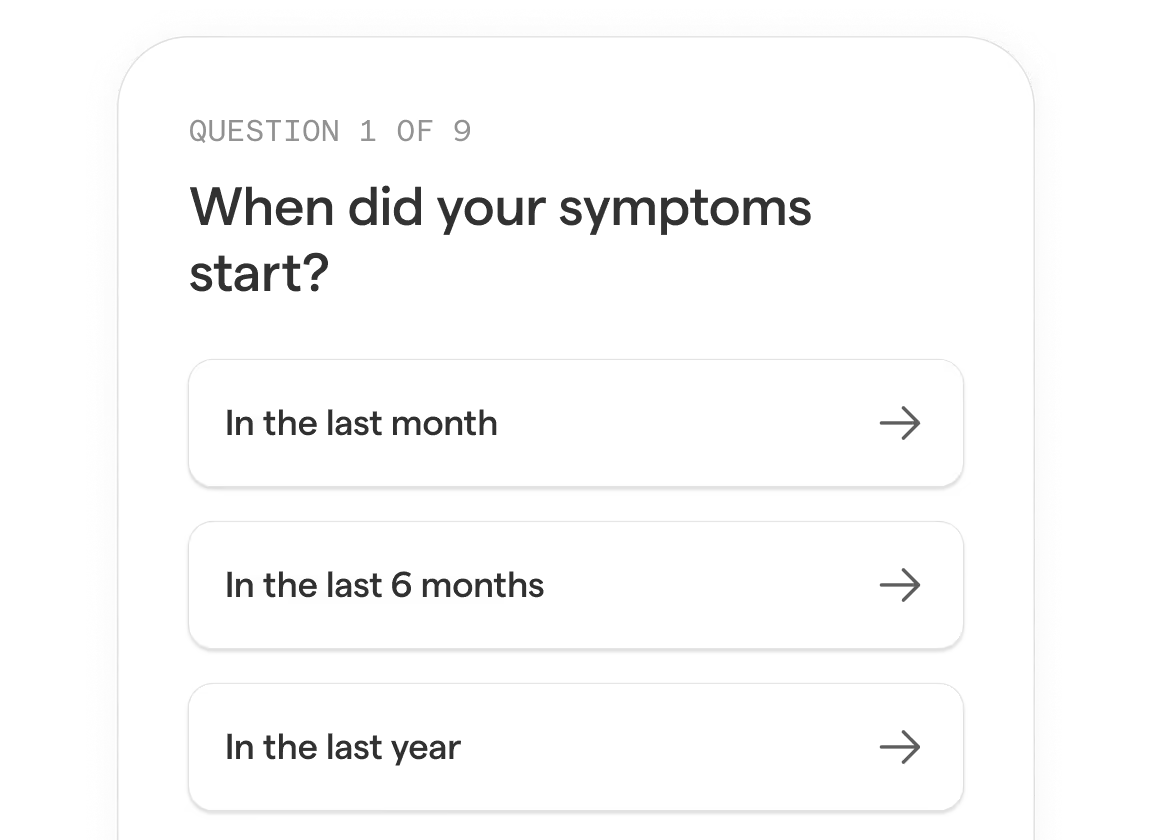Download the Felix App
Earn reward, visit our shop and get exclusive offers on the app
Download now

Through Felix, you can get Premarin® tablets prescribed by a licensed healthcare practitioner with free delivery to your door.
Premarin in its oral form is a medication containing conjugated estrogens that are sustained in a slow-release tablet. Premarin is used to treat atrophic vaginitis, dyspareunia, and kraurosis vulvae.
They have a number of uses, including:
For more resources, including a full list of the risks and benefits of Premarin tablets, please review the product monograph.
As women enter the natural menopausal transition and move into the menopause life cycle, their bodies begin to produce less estrogen.
Premarin tablets work by providing their bodies with estrogen to replace the hormones that their bodies are no longer producing.
In turn, this can help reduce the severity of certain menopause-related symptoms. It also reduces the chances of experiencing certain conditions (i.e., osteoporosis, vulva or vaginal atrophy, etc.), which are also associated with the menopause life cycle.
Premarin dosage strength varies, depending on what symptoms you’re treating and the severity of those symptoms. Practitioners can prescribe Premarin tablets in 0.3mg, 0.625mg, and 1.25mg, depending on what they believe will best serve your individual needs.
There are a number of different uses that oral Premarin treatments are used for. These include:
As a treatment for menopausal and postmenopausal symptoms (specifically, vasomotor symptoms like hot flashes and night sweats)
As a preventative treatment for osteoporosis, caused by low estrogen levels. This is only for women who are already at risk of this condition occurring
To help treat abnormal uterine bleeding, when your healthcare practitioner has been unable to determine the cause of the bleeding
As a treatment for vulva or vaginal atrophy that’s associated with menopause. Specifically, this helps treat symptoms like:
The Premarin dosage recommended for you will depend on the recommendations of your healthcare practitioner, as well as the severity of your ongoing symptoms.
Premarin tablets should be taken on the dosage schedule prescribed by your healthcare practitioner.
These tablets can be taken with or without food, but they should be swallowed whole. Don’t chew, break, or dissolve these pills.
Never take more Premarin than has been prescribed by your healthcare practitioner.
Taking too much estrogen can be dangerous and lead to more severe side effects, while not following your dosage schedule (missing doses) can impact the efficacy of your medication
The most common side effects from taking Premarin tablets include:
Uncommon side effects include:
There are also rare or very rare side effects that occur, appearing in less than 0.1% of people who take this medication:
If any of these side effects begin to become severe, be sure to talk to your healthcare practitioner at Felix. They may be able to suggest an alternative dose of Premarin, or medication that may work better for you.
MHT is the most effective treatment for menopausal symptoms and has been shown to prevent bone loss.
In menopausal women who start appropriately-dosed MHT prior to age 60 OR within 10 years of their last period, the health benefits outweigh the risks.
Risks of MHT are considered very rare (~1 case per 1000 to 10,000 women on MHT per year) and may include:
These conditions are all rare, but they highlight the importance of having a full discussion with your healthcare practitioner; especially if you’re experiencing moderate to severe side effects.
Individualization is key, and your MHT treatment plan should be reassessed (at least) once a year to monitor your health, as well as ensure that you are on the correct dosage and formulation.
Your practitioner can help you find balance between treating your symptoms safely, and avoiding increased risks.
Certain people shouldn’t taken Premarin tablets, including:
It is important to note that Premarin tablets contain lactose.
In addition to these people, there are certain other conditions that you should be sure to make your healthcare practitioner aware of before starting Premarin tablets, such as:
As with many medications, there are certain other medications or dietary factors that can interact with Premarin tablets.
Be sure to let your healthcare practitioner know about any other medications that you’re currently taking. Also, avoid grapefruit juice or herbal products containing St. John’s Wort while using Premarin tablets.
Further reading








Felix is Canada’s first truly integrated healthcare platform. We provide on-demand treatment for everyday health needs like weight loss, mental health, sexual health, and more. Founded in 2019, our digital-first approach to healthcare includes everything from diagnosis to prescription — all accessible from the comfort of home.
No. Felix provides a faster, hassle-free way for you to get a treatment plan for certain conditions, but our service does not replace your primary care provider. For matters that extend beyond obtaining a lifestyle treatment safely and easily, we encourage you to consult your primary health practitioner in person — whether for checkups, personal health concerns, or to inform them about your current treatments or treatment plans.
Absolutely. Our online assessments have been designed to ask all the necessary questions required for diagnosis. We've worked with specialists to create an assessment process that can provide sufficient information for the healthcare practitioner to determine whether or not you are eligible for a prescription and craft an appropriate treatment plan.
Call 911 or proceed to your nearest emergency room immediately. Felix is not intended for medical emergencies. Once the emergency has been addressed or resolved, contact your prescribing practitioner to inform them of your experience as this may impact your current treatment plan.
Anyone who is 18 years or older (16 or older for acne and birth control prescriptions), and is located in Alberta, British Columbia, Manitoba, Newfoundland and Labrador, Nova Scotia, Prince Edward Island, Saskatchewan or Ontario. We cannot ship treatments outside of these provinces at this time.
After creating an account, you will complete a medical assessment for evaluation by one of the Felix healthcare practitioners.
During your assessment, you will have the opportunity to send your practitioner questions via secure messaging.
In most cases, practitioners will complete your assessment with secure messaging alone but sometimes they may determine you require an audio or video visit and/or further diagnostic testing to help determine the best treatment plan for you.
If your practitioner has determined a prescription treatment is appropriate, they will approve your visit and write you a prescription. Our pharmacy will then ship your prescription to your home.
You’ll be able to message your healthcare practitioner if you have questions or want to make changes to your treatment at any time.
No. We use an asynchronous telemedicine model so you can complete your online visit in your own time and we save your progress so you can come back later to finish it.
If you are completing a visit in the mental health or weight loss categories, your healthcare practitioner may require a phone or video call to discuss your medical profile further during the assessment process.
Most assessments do not require a phone or video conversation. Once a prescriber has reviewed the info in your assessment they will respond to you via secure instant messages that you can access within your Felix account.
If you are completing a visit in the mental health or weight loss categories, your healthcare practitioner may require a phone or video call to discuss your medical profile further during the assessment process.
You can expect to receive a response from a healthcare practitioner within 24 hours of submission. If you’ve been waiting longer than this, please reach out to our Patient Support team through the chat bubble in the bottom right corner of your account or our Contact Us page.
No. A visit with a licensed healthcare practitioner is required for all treatments currently provided through Felix’s service.
Not long. After completing your assessment, a practitioner will generally respond within 24 hours, and often much sooner.
Treatment plans will be processed within 2-4 business days of your approval date if there is nothing blocking fulfillment.
All packages usually takes 2-3 business days. You will receive an email with your tracking number once your treatment has been shipped.
Absolutely. All Felix shipments arrive in a nondescript blister package so you can have your treatment shipped wherever makes sense for you as long as there is someone there to sign for it.
A signature upon delivery may be required.
There is currently no cost to have your treatment shipped to you from our Felix Pharmacy network.
Yes, your security is paramount to Felix’s mission. Personal health information provided during your medical assessment is strictly and legally confidential between you and the Felix healthcare practitioner.
Beyond that, all your account information (including the medical assessment, credit card, and shipping information, etc.) is also stored safely and securely. Felix is compliant with all federal and provincial health privacy legislation. It is our duty to protect your data with comprehensive security infrastructure and stringent data policies to ensure it stays private and secure.
Read more on our Privacy Policy.
Yes! In Canada, only a licensed healthcare practitioner can write a prescription, and only a registered pharmacist can fill that prescription. We are supported by leaders in the Canadian pharmacology and specialized medical fields. Felix adheres strictly to all the regulations set forth by all applicable Colleges of Pharmacists and Colleges of Physicians and Surgeons in which we operate.
Absolutely. All prescriptions obtained via Felix are provided by licensed Canadian healthcare practitioners—the same as you would get at a hospital, doctor’s office, or clinic. These practitioners do not provide prescriptions unless they deem it medically safe and appropriate to write them based on your medical profile and assessment answers. Our assessments have been crafted by the practitioners on our medical team. Finally, all Felix Pharmacies are provincially accredited just like any retail pharmacy.
Your privacy is our top priority. All your data is 256 bit SSL/TLS encrypted, and we take significant steps to keep your data secure. You can read our Privacy Policy for more information.
Felix charges a fee for the online visit. In most cases the fee is $40 but varies by treatment category. The visit fee includes a prescription valid for up to a year (depending on the condition) and on-going support from the healthcare practitioner or pharmacist.
It depends. Treatment costs vary but will be in line with what you would pay at a pharmacy in person. You will see the estimated cost of your treatment before insurance, during the online visit but will only be billed for medication costs for your prescription once it is approved and sent to our pharmacy. Once approved, your treatment and payment will be processed within one to two days.
Keep in mind that you won’t necessarily need to pay the full price yourself. If you have insurance, Felix’s partner pharmacies will bill your insurer directly. You may also be eligible for financial support in your province.
We accept all major credit cards for any aspect of your treatment not covered by insurance or other financial support
Treatment coverage varies greatly between different insurance plans.
The good news is that if you are covered, Felix can bill your insurer directly, and then process your treatment plan at no additional cost to you. We recommend that you upload your private and/or provincial benefit card during the online visit so that our pharmacy partner can apply any coverage you are eligible for before processing your treatment plan.
Insurance coverage for treatment plans through Felix doesn't include the cost of your visit.
A Felix online visit is considered asynchronous since it is conveniently completed through a secure chat bases system. Currently, asynchronous visits are not covered by insurance or provincial health plans so you will be charged a visit fee, depending on the category of treatment you are requesting.
Medication coverage varies greatly between different plans, provinces, and has specific criteria that determine eligibility. For private insurance, we recommend contacting your benefits administrator with your details and the Drug Identification Number (DIN) and the drug name to determine your coverage.
For more details on provincial health plan coverage see below:
Alberta: Learn more about AHCIP here. Search for covered drugs here.
British Columbia: Learn more about MSP here. Search for covered drugs here.
Manitoba: Learn more about MHSIP here. Search for covered drugs here.
Newfoundland and Labrador: Learn more about MCP here. Search for covered drugs here.
Nova Scotia: Learn more about MSI here. Search for covered drugs here.
Ontario: Learn more about OHIP+ here. Search for covered drugs here.
Prince Edward Island: Learn more about Health PEI here. Search for covered drugs here.
Saskatchewan: Learn more about Saskatchewan Health Coverage here. Search for covered drugs here.












